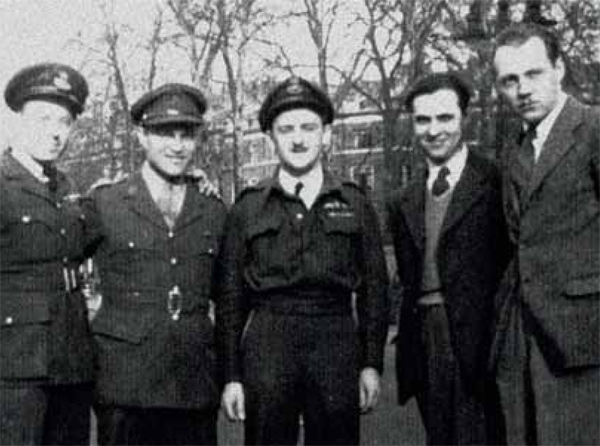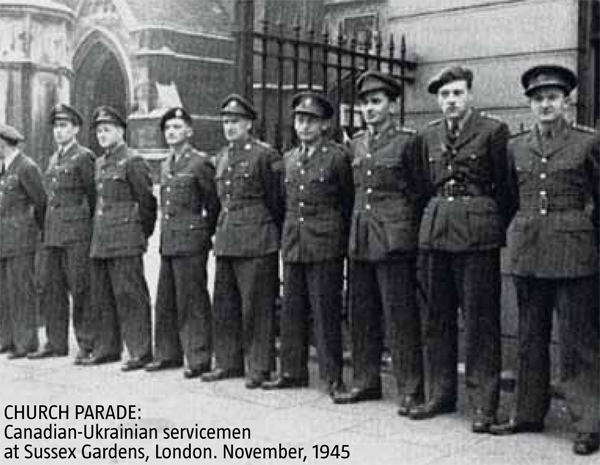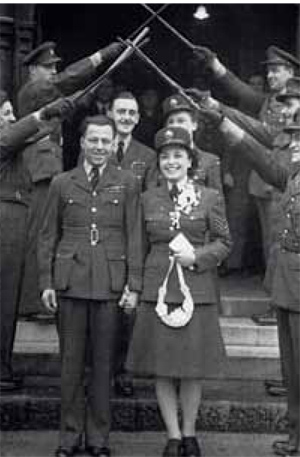There were 45,875 Ukrainian-Canadians fighting in the Canadian armed forced during World War II – they were represented in the army, navy and air force and in all theatres of war: from Europe (including the failed Dieppe assault to the invasion of Italy and D-Day in France) to the Southeastern Asian front. They had their own chaplains – one for the Greek Catholic Ukrainians and one for the Orthodox. And in 1943, they organized the Ukrainian-Canadian Servicemen Association which not only allowed these men and women to interact with each other during their stay in England but was instrumental in helping the thousands of Ukrainian displaced persons after the war.
BECOMING A TRUE CANADIAN
The ethnic Ukrainians who joined the Canadian armed forces represented the best of Canada and the very best of Ukrainian-Canadians. Many of these Ukrainian-Canadians grew up in a traditional Ukrainian household in settlements all around Canada. Brigadier-General Joseph Romanow (b. 1921, d. 2011) recalled that he “was very, consequently, Ukrainian conscious and very much involved in the work of the Ukrainian church in Saskatoon…We became very active, all 5 children, in the Ukrainian National Youth Federation (Ukrainian organization dedicated to preserving Ukrainian-Canadian history and Ukrainian cultural heritage – Ed.) and it was this background that I joined the forces with a very strong cognisance – through the family – of my Ukrainianism.”

READ ALSO: Veterans in the Making
Ukrainian-Canadians joined the armed forces for various reasons – however, most of them had to do with their ethnicity and nationality. General Romanow, the first Ukrainian-Canadian to be promoted to the position of General, for instance, recalled his motivations: “There seemed to be a very good justification because we were very cognisant of Nazi Germany and the order Hitler was establishing, not just for Germany but for the world…It gave us a social justification to go and try to defend Canada as we knew it.” However, he and William Kereliuk both agree that it was their desire to be seen as equal among other Canadians that was also a driving force: “There’s a number of reasons. One of them of course, as most young people, there is a desire to get out and see the rest of the world. But the main driving force for me was because being in a completely Ukrainian area, settlement, and in those days, it wasn’t all rosy. There was an element of discrimination and I didn’t realize at the time, that I wanted to get out and show them that I was every bit Canadian as everybody else could be.” Other veterans such as Dr. Peter Smylski (b. 1915, d. 2002) took a more worldly approach to the issue of joining the Canadian armed forces: “I think that their (Ukrainians’ – Ed.) position was that maybe there was something happening, that this was a crucial moment in history. Europe will be rearranged and hopefully there will be Ukrainian independence and you want to be participants in what was going on. And I think there was a feeling of duty…that you were better Canadians if you were great Ukrainians.’
READ ALSO: Ukrainian Division Continues to Fight
These servicemen saw battle in various forms and in various years. William Chmiliar was recruited into the Intelligence Division of the 1st Canadian Army in 1943 because he could speak, read and write Ukrainian, Polish and Russian (thanks to his father’s love of Slavic languages). Although he never witnessed the invasion of France in June 1944 himself, he did recall that “on the morning of D-Day we stood and watched thousands of planes go overhead.”
General Romanow was stationed in Southeast Asia on the India-China-Burma front with his Ukrainian friend Paul Yuslo. When they went out on a night mission in Romanow’s plane one evening they began reminiscing of the old Ukrainian songs they sang in their local choirs in Saskatoon: “We were singing away merrily then and what I didn’t notice was that the transmit button was on…This singing was broadcast over all of Burma…as a result, when we got back to base, intelligence already had word that some strange language and singing was taking place over the operational zone. Paul and I never, ever admitted it was us and fortunately, we were never found out.”

There were also many Ukrainian-Canadians in the Medical Corps working either as doctors, nurses or dentists. Dr. Melnyk, for example, finished his Bachelor of Sciences in 1941 and enlisted with the infantry. “Due to the Italian campaign (summer-fall 1943 – Ed.) the Canadian army lost many doctors and there was a great demand so the government had us sign up to the army,” he recalled. “Some of the students weren’t very happy because they wanted to go into the navy or air force.”
A POST-WAR MISSION
After the war ended in 1945 and the rebuilding of Europe was taking place, many Canadian-Ukrainian servicemen used their positions to help save thousands of lives. Due to the agreement between the Western Powers and Stalin at the Yalta Agreement, millions of Ukrainians were forcibly repatriated back to the USSR – many against their will and most in brutal and oppressive ways. This dilemma was not lost by the Ukrainian-Canadian servicemen.
When Dr. Peter Smylski was in Rome, he recalled meeting seminarians at St. Josephat’s Seminary in Rome, led by Archbishop Ivan Buchko known as the “Archpastor of the Refugees”. He is the one that told Dr. Smylski about the thousands of Ukrainian Galician Division veterans who were being held in camps in Rimini, Italy. Dr. Smylski set out to help them get a DP (Displaced Persons) status that made their lot a little bit better.
READ ALSO: Eastern Convicts
The servicemen did everything in their power to help all their fellow Ukrainians – they did not discriminate between east and west or between political ideologies. Dr. Paul Kit (b. 1917) describes his first encounter with Ukrainian DPs: “They were so far from home and they treated us like brothers. And that was very nice. I met Dr. Kapusta, he was a dentist in the unit, so he could get a hold of a truck on the weekends…Any help that came from Canada came through him and we distributed it.” A similar experience occurred to Dr. Michael Lucyk (b. 1916), who knew about the Ukrainian DPs before he was posted to Germany and immediately tried to locate these camps. He recalls that “a number of other Ukrainian officers discussed every means possible to see what we could do to assist the people in the camps and to let the authorities know that this cooperation with Soviet forces was not the right thing to do because repatriating these people against their will was sending them to a certain death.”

Those Ukrainian-Canadians who served in the Canadian army made a real and determined impact not only in the history of World War II but also in the cultural milieu of Canada. They were instrumental in helping liberate Europe from Nazi Germany but were equally important in saving thousands of Ukrainians from forced repatriation to the Soviet Union and subsequently the GULAG system. Their work influenced the way Canadians viewed their Ukrainian brethren, they were no longer of the lower class; seen only as the alien sheep-skin wearers from Eastern Europe.

